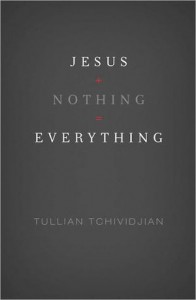Estimated reading time: 3 minute(s)
 A good friend of ours read a book a while ago and thought that I might enjoy it, too. She was right.
A good friend of ours read a book a while ago and thought that I might enjoy it, too. She was right.
What I most enjoyed about this book was it’s emphatic emphasis (is that a thing?) on the singular fullness of Jesus. (Which, I’m sure you already gleaned from the title.)
The concept is, nothing we can add to who Jesus is, and what he has already done, will in anyway add to or enhance our lives, our existence. And, in a slight bending of the commutative property of addition, he asserts that removing Jesus from everything, leaves us with nothing. (That was for my kids, who do not hold much love for math…)
Here’s a quote from early in the book:
God seemed bigger to me than ever, when I’d never been so small.
When you actually feel like you have nothing, Jesus becomes more to you than you ever could have hoped or imagined.
Jesus plus nothing equals everything.
The gospel became for me more than a theological passion more than a cognitive catch-phrase it became my functional lifeline.
Rediscovering the gospel enabled me to see that:
Because Jesus was strong for me, I was free to be weak.
Because Jesus won for me, I was free to lose.
Because Jesus was someone, I was free to be no one.
Because Jesus was extraordinary, I was free to be ordinary.
Because Jesus succeeded for me, I was free to fail.
At a very difficult time in his life, the emphasis of the author’s real, tangible life became completely focused on who Jesus is, what Jesus does for him… and the reality of its completion and accessibility to him. And to us.
The gospel erases us, in [a] sense, which is why we avoid it. But that erasing of self is the key to our freedom.
The gospel doesn’t take you deeper into yourself; the gospel takes you away from yourself. That’s why Paul reminds the Colossians (and us), “You have died, and your life is hidden with Christ in God.” (3:3) The gospel frees us to realize that, while we matter, we’re not the point.“
Jesus is the point.
We who call ourselves Christians certainly already realize this. But it is not often realized in our lives. The days we live. The hopes we have, challenges we face, thoughts we think. We do not live in the fullness and reality of the gospel: that God so loved [all of us] that he took on skin and defeated sin and death, that we might know eternal life. In Him. And then the “Christian life” flows from knowing, accepting, and living that.
At one point the author proclaims a “hatred” for ‘accountability groups’ because of their incorrect focus. Christianity tends to focus on behavior, and inward attempts to change. But the change only comes from Jesus’ work in us. Once on the cross, and ongoing as we walk with him.
He says this about how we can encourage one another as we live our lives in step with the Spirit:
So, instead of trying to fix on another, why don’t we “stir one another up to love and good deeds” by daily reminding one another, in humble love, of the riches we already possess in Christ? ….
Our greatest need is to look at Christ more than we look at ourselves, because the gospel is not our work for Jesus, but Jesus’s work for us.
The truth that this book presents is that we have everything we need in Jesus. Period. The end. Nothing more is needed. Anything else just gets in the way, and takes our focus off of the Life source: Jesus. (Hebrews 12:2 comes to mind.)
Today, if you are weary, or burdened, or feel as though you are missing something… please look to Jesus. He is already there, with you, waiting for you to cease your struggle and simply follow him. Trust him.
If those are just words, please ask Him to show you how to experience them. There is no life without him. Everything minus Jesus is nothing.
But, as Tchividjian says (I just wanted to get his name in here! It’s pretty crazy!):
Jesus, plus nothing, equals everything.
And in that, we are free.

[…] I was reminded by the book I recently recommended here, Jesus is clearly, far-and-away, without-rival, The Most Awesomest Person […]